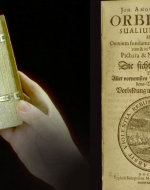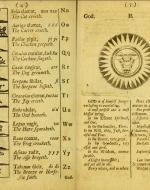Created by leah haveson on Tue, 10/15/2024 - 11:32
Description:
Orbis Pictus or "The World Explained in Pictures" is regarded as the first picture book designed to teach children about the world; it exists as one book in a series of encyclopedias for children full of definitions, Latin, and most importantly illustrations. Czech-born author John Amos Comenius believed that everyone, regardless of gender, should be holistically taught at all stages of life with the ultimate goal of creating a universal education. His phrase “theoria – praxis –chrésis” illuminates his overarching belief that without virtue and piety, or the Protestant ideals of goodness he grew up with, knowledge is useless. The religious concept of Praxis, which is the Greek word for practice, reflects Comenius’s views on the value of universal education. To Commenius, knowledge should not be idle, which is in line with the early didactic authors, but he diverges from that didactic tradition by advancing the idea that learning must be an active and daily learning process. The contents of Orbis Pictus covers a wide array of topics such as “The Riches of the Earth” to “Social Behavior.” This illustrated textbook for children was published in Latin and German in 1658 and subsequently reprinted in over 26 languages; during the last three centuries, over 200 editions of Orbis Pictus have been published. Despite its wide circulation, Orbis Pictus is not as well known as other children's classics included in this exhibition. Nonetheless, it had an impact on the development of children's literature. With the help of exhibitions and contemporary authors and illustrators such as Czech-born Peter Sìs, Orbis Pictus has the potential for a comeback today. This modern day children's book author, was also born in Moravia, where Comenius was born. Sìs, the author of Nicky and Vera, has expressed his intention to revive Comenius’s story in a modern adaptation of Orbis Pictus that will be entertaining for children today.
Jürgen Ovens, Portret van Jan Amos Comenius, ca. 1650-70, Wikipedia. John Amos Comenius was born in 1592 in present day Czech Republic. From a young age and throughout adulthood, Comenius led a life disrupted by religious conflicts, which pushed him further into his faith. His parents were members of the Protestant group Unitas Fratrum, but when he was ten his parents and two of his sisters died. After he became an orphan, the church recognized his passion and took him in while funding a rigorous education. When he had finished his studies, he returned home where he was ordained as a minister. Influenced by Protestant Millennialism and science pioneered by those such as Francis Bacon, Comenius formed progressive views on religion, women, children, and education overall, believing that girls should be taught the same way as boys were. He also believed that science could be used to help unfold and embellish the complexities of his religion. Further, unlike many of the time, he believed that children should be taught with consideration to their individual needs and desires with a focus on more material things than grammar.
After the Thirty Years’ War began, he had to leave his home and family to go into hiding on several occasions, as he was a cleric of the Protestant church. During this time, his first wife and their children died, and then his second wife died as well; his house and library were also burned down. In 1628, after Comemius had married a third time, he fled with his family to Unitas Fratrum o Lezno, Poland. From then until 1652, he devoted his efforts into developing his theories on education, which were the foundation of Orbis Pictus. Following the Northern Wars in 1655, he was forced to abandon his work and life once more to go into hiding where he died in exile in 1670 in Amsterdam. He developed a complex educational theory that influenced all of his works, and other authors and educators that came after him.
Tjebbe van Tijen & Milos Vojtechovsky, Original Cover of Orbis Pictus, 1996, Imaginary Museum. This book aims to be accessible to children, not solely in content but also in size. Many other children’s books, since the publication of Orbis Pictus, have been printed in small sizes so that they can easily be held and read by a child. An example of this formatting can be seen in The Tale of Peter Rabbit by Beatrix Potter. As the case on Peter Rabbit in this exhibit says, Potter felt it was important to make the book child sized for the exact reason of accessibility, and as this picture shows Comenius must have felt the same way. The rest of the museum exhibit focuses on similar manners of adaptive formatting that makes learning easier for children, through the contemporary lens of the Internet.
John Amos Comenius, Orbis Sensualium Pictus, 1658, Topipittori. This image displays pages 4 and 5 of Orbis Pictus. On the left hand page, there is a list of small illustrations which depict various animals. There are two lines for each animal, which tell the reader what animal it is and what sort of noise it makes. These descriptions are written in both Early Modern English and Latin. Alongside these descriptions are the English and Latin alphabet to aid in translation. This page teaches vocabulary, alphabet, language, and common animals, which are foundational elements of childhood education. Comenius believed that children should be taught in a way that was considerate of their learning style, so it follows that the animals that Comenius chose to include on this page were animals that his average reader would be encountering. The illustration of the snake, interestingly, appears to have an arrow as a directional indicator. None of the other illustrations have this, but it adds movement to the drawing. It would likely interest young readers who hadn’t encountered a snake yet to see how snakes move without legs.
The second page of the spread on the right hand side has a poem in Early Middle English and the Latin translation. There is an illustration above the poem which appears to depict flames of the sun, enveloping a pyramid connecting the Latin words: “Pater," “Filus,” and “Spiritus.” This passage refers to the Biblical trio of the Father, the Son, and the Holy Ghost. Additionally, at the top of the page is “God” and the Latin translation “Deus.” The poem itself tells the reader of God’s power and greatness. The last lines read, “A Light inaccessible; and yet all in all. / Every where, and no where.” This is important to understanding Comenius’s proposed core elements of knowledge that children should universally know. Comenius introduces children to the sublimity and imperceptibility of God by saying that God’s power and goodness is both everywhere and nowhere. It appears that Commenius included this poem with the intent to preemptively address any skepticism children may have of the intangible figure.
Tjebbe van Tijen & Milos Vojtechovsky, Orbis Pictus Revised: An Interactive Exhibition, 1996, Imaginary Museum. This image is from an art exhibition containing a visual manifestation of how Orbis Pictus functioned like the Internet does at a prototypical level. The designers created a learning station that acts like a more evolved version of Orbis Pictus; the "stool for children" as labeled shows how the set up is meant to accommodate the child by giving them a child-sized seat, like a stool. Orbis Pictus was full of thousands of definitions and illustrations, all compacted and readily accessible for young users, and this landmark in the evolution of early education anticipates how the Internet is widely available to children today. The tableaux in this book, like the art exhibit points out, anticipate tabs on a navigation bar on a computer screen. This text is an early landmark in children's literature and was one of the first children's books to prioritize illustrations as a guide for entertainment and learning. Comenius believed that people should continue learning their whole lives with the ultimate goal of peace, having lived his life as a refugee of war and persecution. Within the study of literature, or any media studies, this book is a milestone in the development of distributing information to children.





